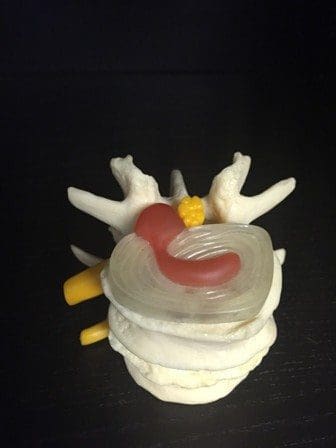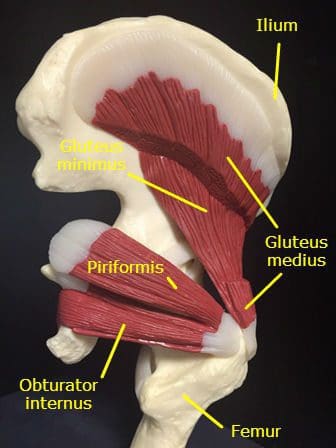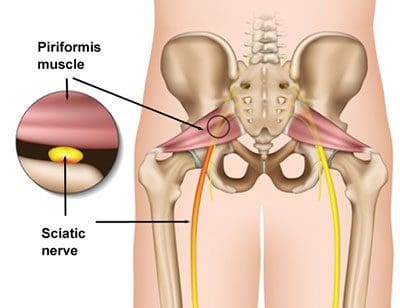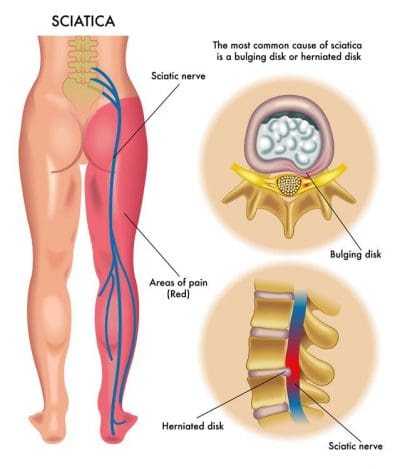Pain that travels from the back down the leg and into the foot is known as sciatica, which is an overall expression for pain that is excruciating. The term does not clarify why, or what tissue is injured. In reality accidents can cause gastrointestinal pain, together with piriformis syndrome, lumbar spinal disc herniations, and sprains being the three most frequent types of injuries and conditions affecting health and wellness.
Piriformis syndrome is commonly misdiagnosed as a spinal disc herniation, because the pattern of radiating pain, in the back to the lower elevation, is similar in both cases. With both injuries, individuals experience pain with the same type of motions, particularly rising from a seated position, standing for prolonged period of time, or sleeping. At the same time, the pain related to both injuries feels better once you curl up in the fetal position on your side.
A spinal disc herniation occurs when the jelly-like substance from inside the lumbar disc compresses the spinal cord or nerve. Either the disc material compresses the nerves when squeezed out of this disc, or else the compression of the nervous tissue is caused by inflammation. A spinal disc herniation is generally considered a severe injury, causing a massive amount of restriction and back pain. Some folks lose sensation in their legs. They can experience numbness and tingling through the day. Several have tingling, burning, dull, or pain in leg, glutes, and their own back. These are all symptoms associated with sciatica. Compression of particular nerves causes muscle fatigue and loss of feeling.

Table of Contents
Herniated Disc Treatments
Therapy entails helping the body break down the spinal disc material, and relieving the compression of the nerves. Spinal disc decompression treatments are treatments for disc herniations. Flexion distraction therapy is also a way of decreasing pressure in the low back. Patients benefit from at-home utilization of inversion tables. Improve movement in the back joints and stretches and light exercises are used to decrease muscle spasms.
Massage treatment is focused on the back, buttocks, and hamstring muscles to decrease spasms and to reach the lumbar spine and pelvis. Individuals with disc herniations have weakness within their muscles, which need to be strengthened with therapy in order to increase strength, endurance, and muscle coordination patterns. Patients with a history of previous disc herniations or back injuries benefit immensely from strengthening therapy to prevent injuries.
Piriformis Syndrome and Treatment
The piriformis muscle is a really strong and powerful muscle that runs from the sacrum into the femur. It runs beneath gluteal muscles the nerve travels beneath them. If this muscle goes into spasm, then the nerve creates radiating pain, numbness, tingling, or burning out of the buttocks to the leg and foot. People do experience pain together with the syndrome. Other people develop the syndrome while dealing with chronic low back pain.
Activities and motions that cause the piriformis muscle to contract further compress the sciatic nerve, causing pain. This muscle can be contracted once we squat, or stand, walk , go up steps. It tends to tighten when we sit at any position for more than 20 to 30 minutes.
Individuals who have a history of chronic low back pain frequently assume that their radiating sciatic pain is traceable to their lower spine. Their history of disc herniations, or sprains, strains has taught them to assume that it will go away like normal, and that the pain is out of their spine. It is just when the pain doesn’t respond as usual that individuals seek therapy, thus delaying their recovery.


Treatment for piriformis syndrome entails decreasing the intensity of the piriformis muscle spasm that’s controlling the sciatic nerve. Trigger point therapy, massage therapy, ice, heat, electrical, and stretching are involved with the early stages of care. Deep massage therapy is not advised in the first phases of piriformis syndrome. Some of the pain may be relieved during the therapy, but individuals experience worsening symptoms the following day. After the piriformis muscle is worked deeply it might relax for a short time period before it goes to a bigger spasm, further worsening the gastrointestinal pain.
Chiropractic Therapy for Sciatica Symptoms
Chiropractic therapies and treatment goals are to increase joint selection of motion and reduce muscle spasms. Muscle spasms increase tension and pressure on the lumbosacral and sacroiliac regions, which raises back pain. Treatment restores motion in these regions. Treatment and remedies to improve flexibility and reduce spasms accelerate healing and healing times for many types of back pain.
Often, people aggravate their piriformis muscle when they’re protecting or protecting their low back. They may have strength and capacity to compensate, bend, turn, and twist — thus, to squat, they overwork piriformis muscles and their glutes. Treatment should focus on increasing strength and endurance of their muscles, to reduce strain and injury.
Both piriformis syndrome and spinal disc herniations produce radiating pain in the very low back and to the leg. They are two different injuries, requiring treatments for recovery and regular healing. They are both commonly associated with flexibility and low back weakness. Treatment should address the acute traumas but also the core weaknesses that resulted in the condition.
The scope of our information is limited to chiropractic and spinal injuries and conditions. To discuss options on the subject matter, please feel free to ask Dr. Jimenez or contact us at 915-850-0900 . 
By Dr. Alex Jimenez
Additional Topics: Sciatica
Lower back pain is one of the most commonly reported symptoms among the general population. Sciatica, is well-known group of symptoms, including lower back pain, numbness and tingling sensations, which often describe the source of an individual’s lumbar spine issues. Sciatica can be due to a variety of injuries and/or conditions, such as spinal misalignment, or subluxation, disc herniation and even spinal degeneration.
.video-container { position: relative; padding-bottom: 63%; padding-top: 35px; height: 0; overflow: hidden;}.video-container iframe{position: absolute; top:0; left: 0; width: 100%; height: 90%; border=none; max-width:100%!important;}
Post Disclaimer
Professional Scope of Practice *
The information on this blog site is not intended to replace a one-on-one relationship with a qualified healthcare professional or licensed physician and is not medical advice. We encourage you to make healthcare decisions based on your research and partnership with a qualified healthcare professional.
Blog Information & Scope Discussions
Welcome to El Paso's Premier Wellness and Injury Care Clinic & Wellness Blog, where Dr. Alex Jimenez, DC, FNP-C, a board-certified Family Practice Nurse Practitioner (FNP-BC) and Chiropractor (DC), presents insights on how our team is dedicated to holistic healing and personalized care. Our practice aligns with evidence-based treatment protocols inspired by integrative medicine principles, similar to those found on this site and our family practice-based chiromed.com site, focusing on restoring health naturally for patients of all ages.
Our areas of chiropractic practice include Wellness & Nutrition, Chronic Pain, Personal Injury, Auto Accident Care, Work Injuries, Back Injury, Low Back Pain, Neck Pain, Migraine Headaches, Sports Injuries, Severe Sciatica, Scoliosis, Complex Herniated Discs, Fibromyalgia, Chronic Pain, Complex Injuries, Stress Management, Functional Medicine Treatments, and in-scope care protocols.
Our information scope is limited to chiropractic, musculoskeletal, physical medicine, wellness, contributing etiological viscerosomatic disturbances within clinical presentations, associated somato-visceral reflex clinical dynamics, subluxation complexes, sensitive health issues, and functional medicine articles, topics, and discussions.
We provide and present clinical collaboration with specialists from various disciplines. Each specialist is governed by their professional scope of practice and their jurisdiction of licensure. We use functional health & wellness protocols to treat and support care for the injuries or disorders of the musculoskeletal system.
Our videos, posts, topics, subjects, and insights cover clinical matters and issues that relate to and directly or indirectly support our clinical scope of practice.*
Our office has made a reasonable effort to provide supportive citations and has identified relevant research studies that support our posts. We provide copies of supporting research studies available to regulatory boards and the public upon request.
We understand that we cover matters that require an additional explanation of how they may assist in a particular care plan or treatment protocol; therefore, to discuss the subject matter above further, please feel free to ask Dr. Alex Jimenez, DC, APRN, FNP-BC, or contact us at 915-850-0900.
We are here to help you and your family.
Blessings
Dr. Alex Jimenez DC, MSACP, APRN, FNP-BC*, CCST, IFMCP, CFMP, ATN
email: coach@elpasofunctionalmedicine.com
Licensed as a Doctor of Chiropractic (DC) in Texas & New Mexico*
Texas DC License # TX5807
New Mexico DC License # NM-DC2182
Licensed as a Registered Nurse (RN*) in Texas & Multistate
Texas RN License # 1191402
ANCC FNP-BC: Board Certified Nurse Practitioner*
Compact Status: Multi-State License: Authorized to Practice in 40 States*
Graduate with Honors: ICHS: MSN-FNP (Family Nurse Practitioner Program)
Degree Granted. Master's in Family Practice MSN Diploma (Cum Laude)
Dr. Alex Jimenez, DC, APRN, FNP-BC*, CFMP, IFMCP, ATN, CCST
My Digital Business Card



